Episodes
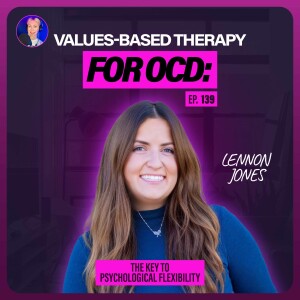
Tuesday Jun 24, 2025
139. Values-Based Therapy for OCD: The Key to Psychological Flexibility
Tuesday Jun 24, 2025
Tuesday Jun 24, 2025
Living with OCD isn’t just about managing anxiety—it’s about reclaiming your life through your values. In this powerful episode of the OCD Whisperer Podcast, host Kristina Orlova welcomes OCD therapist Lennon Jones, founder of Golden Hour OCD and Anxiety, to explore how personal values bring clarity, purpose, and resilience to Exposure and Response Prevention (ERP) therapy.
ERP, first line treatment for OCD treatment, can often feel grueling, especially when it’s reduced to simply "sitting with anxiety." Lennon shares why this approach can feel torturous without an internal compass—and how integrating Acceptance and Commitment Therapy (ACT) shifts the focus from fear to meaning. Together, Kristina and Lennon unpack how clarifying your values (like connection, creativity, or service) can turn exposures from hollow tasks into empowering acts of self-trust.
They dive into psychological flexibility, the antidote to OCD’s rigid thinking, and offer real-life examples of how values-based actions—even small ones—can help you live with purpose, despite intrusive thoughts. Whether you're just starting treatment or navigating setbacks, this episode offers hope, compassion, and actionable guidance for building a life driven by what matters most.
Tune in to learn how to stop living for certainty—and start living for your values.
The 3 things you’ll learn in today’s episode:
What makes OCD treatment feel torturous—and how a simple mindset shift can change everything
The surprising mistake many people make with exposure therapy (and what to do instead).
Why saying “maybe I am a terrible person” might actually be the path to healing.
In This Episode
[00:00:01] Introduction and guest welcome
[00:01:10] The importance of values in ERP
[00:03:57] Meaning behind exposures
[00:05:48] Blending ERP and ACT: Facing daunting thoughts
[00:09:25] Building a solid values base
[00:10:13] Evolution of ERP and incorporating values
[00:11:45] Values in relationship OCD
[00:12:33] Values are not perfection
[00:14:19] Introducing psychological flexibility
[00:15:13] CBT, ERP, and psychological flexibility
[00:18:33] Recognizing rigidity and all-or-nothing thinking
[00:20:17] Practical values-based tool
[00:24:05] Exposure to your true self
[00:25:41] Autonomy and making choices
[00:26:44] Trusting yourself and closing thoughts
[00:27:03] How to find Lennon
Notable Quotes
[02:15] "Exposure therapy should not be torture. And if it doesn't have those values, beliefs, that trust in yourself behind it, a lot of times it can be torturous for people." —Lennon
[23:59] "Sometimes the exposure we’re trying to do is exposing yourself to who you really are.." — Lennon
[11:48] "If I'm having a relationship-based OCD and not sure about my partner, but I know connection is a value for me, then yeah, maybe I’m going to go and spend time with my partner even though I'm feeling anxious and uncomfortable."— Kristina
[12:47] "A value per se is not measurable. Like you can't reach a certain level of perfection in the value." — Lennon
[13:59] "Psychological flexibility... is the goal of exposure therapy. We want to be more flexible in these situations. We want to just enjoy our lives." — Lennon
[21:58] "I’m open about my OCD. There’s still a certain way I thought, and next thing you know, you’re right back in this anxious state that just feels horrendous.'." — Kristina
[23:12] "Even in an area where your senses can't detect anything, the reasonable, rational way to live is to do that functional certainty thing and just to assume you're okay." — Mike Parker
Our Guest
Lennon Jones is a licensed OCD and anxiety therapist based in Southern Utah and the founder of Golden Hour OCD and Anxiety, a digital platform offering support and education for those navigating OCD recovery. She specializes in Exposure and Response Prevention (ERP) and Acceptance and Commitment Therapy (ACT), helping clients move from fear-driven behavior to values-based living. Lennon is also involved in global mental health efforts, providing free therapy to Ukrainian refugees. Her approach is grounded in compassion, psychological flexibility, and helping clients reconnect with who they are beyond OCD.
Resources & Links
Kristina Orlova, LMFT
Instagram
YouTube
OCD CBT Journal Tracker and Planner
Website
Lennon Jones
Website
Facebook
Instagram
YouTube
Mentioned
Cognitive Therapy for OCD
I-CBT Training Online
Sneaky Rituals with Jenna Overbaugh
ICBT with Kristina Orlova and Christina Ennabe
Please note, while our host is a licensed marriage and family therapist specializing in OCD and anxiety disorders in the state of California, this podcast is for educational purposes only and should not be considered a substitute for therapy.
Stay tuned for weekly episodes filled with valuable insights and tips for managing OCD and anxiety. And remember, keep going in the meantime. See you in the next episode!

Tuesday Jun 10, 2025
138. CLINICAL DIRECTOR Reveals: This Is Why You Struggle With Your Self-Image
Tuesday Jun 10, 2025
Tuesday Jun 10, 2025
🧠 Episode Summary: Struggling with feeling ugly, ashamed, or alone?
In this episode, Dr. Sony Khemlani-Patel shares insights from 25+ years of treating OCD and Body Dysmorphic Disorder (BDD). Discover how BDD affects self-worth, why it’s often misunderstood, and what real recovery looks like.
🔍 What You’ll Learn:
• How Body Dysmorphic Disorder (BDD) differs from body image issues and eating disorders• Why people with BDD often suffer in silence—and what keeps them from speaking up• The impact of social media, AI, and perfection culture on self-perception• Real-life insights from clinical practice, including powerful patient stories• How shame, trauma, and brain biology intertwine in BDD• What therapy approaches work best—and how to break the comparison cycle• How to recognize the signs of BDD and take the first step toward healing
⏱️ TIMESTAMPS:[00:00:23] Introduction to the episode[00:01:48] BDD vs Body Image vs Eating Disorder: Understanding the Differences[00:03:36] Eating Disorders and BDD: How They Overlap and What Makes Them Different[00:05:10] BDD and Distorted Perception: Seeing Flaws That Aren’t Really There[00:05:51] Is BDD in the Brain? The Biological Side of the Disorder[00:06:53] Best Real-Life Example of BDD in Everyday Life[00:07:26] Hyperfocusing: When the Brain Locks Onto Details and You Zoom Out[00:07:53] The Patient Who Was a Photographer: A Unique BDD Story[00:08:25] What to Say When Someone’s “Flaw” Isn’t Just in Their Head[00:09:46] Is BDD Caused by Trauma or Is it Something Else?[00:10:52] Understanding the Gap Between Appearance and Body Image[00:12:07] Looking in the Mirror: Carrying the Weight of Childhood and Environment[00:12:53] Spotting BDD in Yourself: Key Warning Signs and Actions[00:15:36] What Percentage of People with BDD Experience Suicidal Thoughts?[00:16:08] Why People Hide Their BDD from Doctors and Loved Ones[00:17:13] The Comparison Trap: AI, Social Media, and Unrealistic Perfection[00:19:04] How to Stop Comparing Yourself and Find Peace[00:19:59] What Therapy Works Best for BDD? Expert Recommendations[00:21:44] Managing Heavy Emotions and Shame in BDD Treatment[00:23:13] Closing Reflections and Final Thoughts
🛠️ Resources & Links Mentioned:
🎁 Free Download: https://shorturl.at/KcTxM
📓 OCD Journal: https://shorturl.at/7pUxB
✅Bio Behavioral Institute:
👉Instagram - https://www.instagram.com/bio.behavioral/
👉Website - www.biobehavioralinstitute.com
👤 About the Host:
The OCD Whisperer Podcast is hosted by Kristina Orlova, LMFT, a licensed therapist who has helped hundreds of clients with OCD and anxiety using ERP, ACT, and ICBT.
🌐 Learn more: www.korresults.com
📸 Instagram: https://www.instagram.com/ocdwhisperer
📧 Subscribe to the newsletter: https://shorturl.at/KcTxM
🎧 Subscribe & Follow:
Never miss an episode!
🟢 Spotify → https://shorturl.at/k5kEq
🍎 Apple Podcasts → https://shorturl.at/C30wn
📻 All platforms → https://ocdwhisperer.podbean.com/
🔔 Youtube → https://www.youtube.com/@OCDWhisperer
⚠️Disclaimer: Please note while the host is a licensed marriage and family therapist specializing in OCD and anxiety disorders in the state of California, this podcast is for educational purposes only and should not be considered a substitute for therapy.
© OCD Whisperer
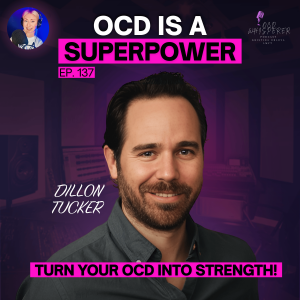
Tuesday Jun 03, 2025
137. How a Film Director Used OCD as Fuel: The Story Behind the Film PURE O
Tuesday Jun 03, 2025
Tuesday Jun 03, 2025
🧠 Episode Summary: What if your own mind was the biggest mystery you ever had to solve?
In this episode of The OCD Whisperer Podcast, Kristina Orlova sits down with writer and director Dillon Tucker, creator of the narrative feature film PURE O. Diagnosed with OCD himself, Dillon shares how the chaos, fear, and obsessive spirals of his own mind became the raw material for a deeply personal and groundbreaking movie. Together, they explore the power of storytelling to humanize OCD, break stigma, and reach those silently suffering.
This isn’t just a film—it’s a lifeline for people who feel misunderstood, unseen, and trapped in their own thoughts. Because sometimes the most healing thing we can do… is turn pain into art.
🔍 What You’ll Learn:
• How turning OCD pain into art can be healing for you and others• Why films like PURE O matter in breaking OCD stigma• What makes OCD storytelling different from typical mental health narratives• How OCD can be reframed as a superpower through creativity and advocacy
⏱️ TIMESTAMPS:
[00:00:01] Introduction to the episode [00:01:35] Did Dillon Expect the Film to Be Therapeutic for Others? [00:03:00] What Viewers Said After Watching Film [00:04:05] Dilan’s Emotional Response to Seeing the Finished Film [00:04:15] The Purpose Behind Making This Movie [00:05:30] Where the Film Stands Now & What’s Coming [00:06:30] Why Everyone Should Watch This Movie — Not Only People with OCD [00:07:20] We Need More Stories, Films, and Resources on OCD [00:08:05] What to Know Before Making Something Similar / Manage Emotional Weight [00:10:00] OCD as a Superpower: Boosting Your Potential [00:11:25] First Time Screening the Film in a Movie Theater [00:13:00] How Family Reacted to the Film’s Premiere [00:13:30] Dilon's OCD Advocacy and Impact Today [00:14:28] The Community Built Through OCD Advocacy [00:14:47] OCD Is Gaining Awareness and Acceptance [00:15:46] Why Mainstream Media Representation of OCD Matters [00:17:36] Movie Characters Development Explained [00:18:28] OCD and the Pain of Social Isolation / Educating Loved Ones About OCD [00:20:04] Other Popular Films and Series Featuring Disorders [00:21:27] Where Can You Watch the Film? / Where Can You Reach Out to Them? [00:22:20] Closing Reflections and Final Thoughts
🛠️ Resources & Links Mentioned:
🎁 Free Download: https://shorturl.at/KcTxM
📓 OCD Journal: https://shorturl.at/7pUxB
✅Dillon Tucker:
👉Instagram - https://www.instagram.com/dillontucker/
✅Pure O Movie:
👉Instagram - https://www.instagram.com/pure_o_movie/?utm_source=ig_web_button_share_sheet&igsh=ZDNlZDc0MzIxNw%3D%3D
👉Buy/rent a movie - https://www.amazon.com/gp/video/detail/B0CVR6M2NJ/ref=atv_dp_share_cu_r
👉Watch on Tubi -https://shorturl.at/C5PGX
👤 About the Host:
The OCD Whisperer Podcast is hosted by Kristina Orlova, LMFT, a licensed therapist who has helped hundreds of clients with OCD and anxiety using ERP, ACT, and ICBT.
🌐 Learn more: www.korresults.com
📸 Instagram: https://www.instagram.com/ocdwhisperer
📧 Subscribe to the newsletter: https://shorturl.at/KcTxM
🎧 Subscribe & Follow:
Never miss an episode!
🟢 Spotify → https://shorturl.at/k5kEq
🍎 Apple Podcasts → https://shorturl.at/C30wn
📻 All platforms → https://ocdwhisperer.podbean.com/
🔔 Youtube → https://www.youtube.com/@OCDWhisperer
⚠️Disclaimer: Please note while the host is a licensed marriage and family therapist specializing in OCD and anxiety disorders in the state of California, this podcast is for educational purposes only and should not be considered a substitute for therapy.
© OCD Whisperer
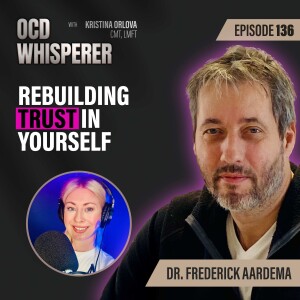
Tuesday May 27, 2025
136. Rebuilding Trust in Yourself: OCD, Identity, and the ICBT Path to Healing
Tuesday May 27, 2025
Tuesday May 27, 2025
Episode Summary: Do you feel trapped in endless loops of “what if”? Like your brain is constantly playing out worst-case scenarios, you can’t prove, but can’t ignore either? In this episode of The OCD Whisperer Podcast, I’m joined by Dr. Frederick Aardema, clinical psychologist, OCD researcher, and co-creator of Inference-Based Cognitive Behavioral Therapy (ICBT).
Together, we unpack how faulty reasoning and imagination, not just intrusive thoughts, drive OCD. Dr. Aardema shares how ICBT offers a powerful path back to reality, trust, and your authentic self—without relying on fear-based exposures.
🔍 What You’ll Learn:
Why OCD is more about reasoning than anxiety
How imagination overrides perception in OCD
The concept of “functional certainty” and how it heals obsessional doubt
How ICBT differs from ERP and when to use which
Why your OCD may be rooted in a “false self” and how to reconnect with who you really are
🛠️ Resources & Links Mentioned:
OCD Journal → https://shorturl.at/7pUxB
Guest: Dr. Frederick Aardema’s Books → Resolving OCD Vol. 1 & Resolving OCD Vol. 2
ICBT Online Resource Center → https://icbt.online
ICBT Masterclass → https://www.korresults.com/icbtmasterclass
Sneaky Rituals Masterclass → https://www.korresults.com/sneakyrituals
📩 Take Action: 👉 Subscribe to the newsletter → https://shorturl.at/KcTxM
👤 About the Host: The OCD Whisperer Podcast is hosted by Kristina Orlova, LMFT, a licensed therapist who helps people with OCD and anxiety using ERP, ACT, and ICBT. 🌐 Learn more: www.korresults.com 📸 Instagram: https://www.instagram.com/ocdwhisperer 📧 Subscribe to the newsletter: https://shorturl.at/KcTxM
🎧 Subscribe & Follow: 🟢 Spotify → https://shorturl.at/k5kEq 🍎 Apple Podcasts → https://shorturl.at/C30wn 📻 All platforms → https://ocdwhisperer.podbean.com/ 🔔 Youtube → https://www.youtube.com/@OCDWhisperer
Disclaimer
Please note, while our host is a licensed marriage and family therapist specializing in OCD and anxiety disorders in the state of California, this podcast is for educational purposes only and should not be considered a substitute for therapy.
Stay tuned for weekly episodes filled with valuable insights and tips for managing OCD and anxiety. And remember, keep going in the meantime. See you in the next episode!
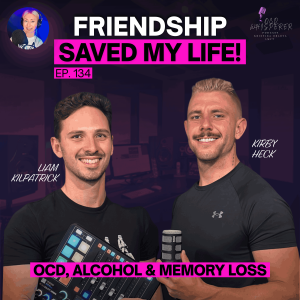
Tuesday May 20, 2025
135. OCD, Alcohol & Memory Loss - How a Friend Saved My Life
Tuesday May 20, 2025
Tuesday May 20, 2025
🧠 Episode Summary:
In this podcast episode, two close friends delve into a journey of battling OCD, confronting alcohol dependency, and the transformative power of support. They discuss the daily challenges of living with obsessive-compulsive disorder, the spiral into substance use, and how a steadfast friendship became the cornerstone of recovery.
🔍 What You’ll Learn:
The difference between mental compulsions and real problem-solving
Response prevention and OCD limits
Strategies that helped manage OCD
How to respond when intrusive thoughts hit
[00:00:01] Introduction to the episode
[00:01:45] Childhood with OCD: daily struggles
[00:02:20] The descent into alcohol use and memory loss
[00:04:15] Developing a new obsession
[00:05:41] Opening up to a trusted friend
[00:06:30] Realizing it’s OCD & taking the first step
[00:07:34] Obsessing over OCD and facing new problems
[00:08:54] Turning point towards healing
[00:09:20] Friendship that changed everything
[00:10:05] What helped the most in recovery
[00:12:50] Strategies that helped manage OCD
[00:14:50] The power of not answering OCD
[00:17:23] How a friend found a way to help
[00:19:13] Lessons learned and moving forward
[00:21:27] OCD has no limits: response prevention
[00:22:20] Encouragement for those struggling
[00:23:20] Closing reflections and final thoughts
👤 About the Host:
The OCD Whisperer Podcast is hosted by Kristina Orlova, LMFT, a licensed therapist who has helped hundreds of clients with OCD and anxiety using ERP, ACT, and ICBT.
🌐 Learn more: www.korresults.com
📸 Instagram: https://www.instagram.com/ocdwhisperer
📧 Subscribe to the newsletter: https://shorturl.at/KcTxM
🎧 Subscribe & Follow:
Never miss an episode!
🟢 Spotify → https://shorturl.at/k5kEq
🍎 Apple Podcasts → https://shorturl.at/C30wn
📻 All platforms → https://ocdwhisperer.podbean.com/
🔔 Youtube → https://www.youtube.com/@OCDWhisperer
🛠️ Resources & Links Mentioned:
📓 OCD Journal → [Insert link] https://shorturl.at/7pUxB
🧠 Guests: Liam & Kirby
📸 Instagram → https://www.instagram.com/sharedmindspodcast/
🔔 Youtube → https://www.youtube.com/@SharedMindsPodcast
🟢 Spotify → https://open.spotify.com/show/1fIUNuUyovjDJM3bIaqCKu
Disclaimer
Please note, while our host is a licensed marriage and family therapist specializing in OCD and anxiety disorders in the state of California, this podcast is for educational purposes only and should not be considered a substitute for therapy.
Stay tuned for weekly episodes filled with valuable insights and tips for managing OCD and anxiety. And remember, keep going in the meantime. See you in the next episode!
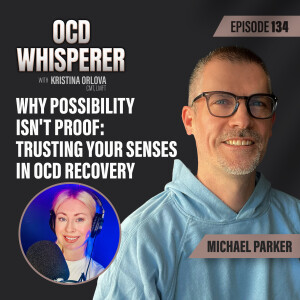
Tuesday Apr 29, 2025
Tuesday Apr 29, 2025
You wash your hands… but did you really get them clean? You wiped down the package… but what if something invisible is still there? You tell yourself it’s fine, yet your brain won’t let it go. If that sounds familiar, you’re not alone.
In this episode of the OCD Whisperer Podcast, Kristina Orlova welcomes back Mike Parker, licensed clinical social worker and creator of the OCD Space YouTube channel, to explore the obsessive doubt that drives contamination fears—and the path out of its grip.
Together, they dive into the complexities of inference-based cognitive behavioral therapy (ICBT) and how it helps those with OCD step out of fear-driven reasoning and back into reality.
But how do you convince your mind to trust your senses when OCD keeps whispering “what if”? Whether it’s worries about unseen germs on a park bench, contamination from a package, or the lingering fear of harming others through inaction, this conversation lays it bare.
Mike and Kristina break down the difference between healthy caution and compulsive checking, and why the way we reason matters just as much as the content of our fears. They explore how OCD hijacks imagination and certainty, and why choosing functional certainty—the decision to act as if you’re okay unless proven otherwise—can be a powerful turning point.
Can you learn to trust your senses again? Or will your imagination keep calling the shots?
Tune in and find out—this might just change how you see everything… especially what you can’t see. Let's dive in!
In This Episode
[00:00:03] Introduction to the episode
[00:00:53] Understanding ICBT
[00:01:08] Discussion on contamination fears
[00:02:13] Addressing invisible threats
[00:03:04] Grounding in reality
[00:06:37] Healthy reasoning vs. OCD reasoning
[00:10:21] Living with possibility
[00:12:06] Inferential confusion in OCD
[00:13:33] Constantly thinking about the unseen
[00:14:24] Helping clients recognize reality
[00:15:29] The challenge of OCD as a competitor
[00:16:50] Understanding reality and OCD
[00:18:48] Trust and perception
[00:19:30] Reality sensing in CBT
[00:20:43] Behavioral change and CBT
[00:21:58] Individualized treatment approaches
[00:23:01] Possibility vs. sensory information
[00:24:02] Relying on senses
[00:24:25] Closing remarks and resources
Notable Quotes
[03:04] "It's true our senses can't detect certain things, but we have ways of dealing with that. They're already established, you know, as far as hand washing routines or, you know, if it's a religious situation, how much you should pray, what rituals you should do." — Mike Parker
[06:06] "Healthy reasoning is like, okay, I know the limitations of my senses. I know what information I have available, and then ultimately I'm gonna make that decision based on that." — Mike Parker
[07:07] "If you really want to sit on park benches and stop doing that. Let's realize you don't have to actually concern yourself with what you can't." — Mike Parker
[15:59] "So, right, what you're telling me basically, is you're walking down the street and you have no visible poop on you, and you don't smell poop on you, and you're thinking about poop. We gotta figure out what's going on there, because you don't do that anywhere else in life." — Mike Parker
[21:58] "I’m open about my OCD. There’s still a certain way I thought, and next thing you know, you’re right back in this anxious state that just feels horrendous.'." — Kristina
[23:12] "Even in an area where your senses can't detect anything, the reasonable, rational way to live is to do that functional certainty thing and just to assume you're okay." — Mike Parker
Our Guest
Mike Parker, LCSW, is a licensed clinical social worker and private practice therapist based in Pittsburgh, Pennsylvania. He specializes in treating obsessive-compulsive disorder (OCD) using cognitive-behavioral therapy (CBT) and inference-based cognitive therapy (I-CBT). As the host of the OCD Space YouTube channel, Mike is dedicated to educating individuals and mental health professionals on effective OCD treatment approaches. He is passionate about helping clients understand and overcome obsessional doubt while also training fellow therapists in evidence-based interventions. With a focus on empowering individuals to trust themselves and break free from the cycle of compulsions, Mike continues to be a leading voice in the OCD treatment community.
Resources & Links
Kristina Orlova, LMFT
Instagram
YouTube
OCD CBT Journal Tracker and Planner
Website
Mike Parker
Website
LinkedIn
YouTube
Mentioned
Cognitive Therapy for OCD
I-CBT Training Online
Sneaky Rituals with Jenna Overbaugh (https://www.korresults.com/sneakyrituals)
ICBT with Kristina Orlova and Christina Ennabe (https://www.korresults.com/icbtmasterclass)
Disclaimer
Please note, while our host is a licensed marriage and family therapist specializing in OCD and anxiety disorders in the state of California, this podcast is for educational purposes only and should not be considered a substitute for therapy.
Stay tuned for bi-weekly episodes filled with valuable insights and tips for managing OCD and anxiety. And remember, keep going in the meantime. See you in the next episode!
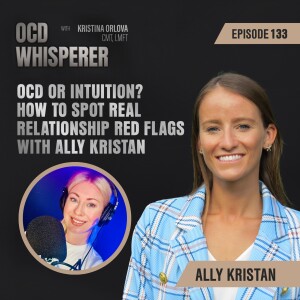
Tuesday Apr 15, 2025
133. OCD or Intuition? How to Spot Real Relationship Red Flags with Ally Kristan
Tuesday Apr 15, 2025
Tuesday Apr 15, 2025
There’s a quiet tension in love when you live with OCD—an unshakable feeling that something’s off, followed by crushing doubt: Is this real, or is it just my disorder? You learn to second-guess yourself, to dismiss your instincts, to stay in places that feel unsafe because your brain tells you fear is always a lie. But what if it isn’t?
In this episode of The OCD Whisperer Podcast, host Kristina Orlova talks with marine biologist, Antarctic researcher, and Braving the Waves author Ally Kristan about the dangerous intersection of OCD and relationships. Diagnosed at 12, Ally knows how OCD can distort reality—how you can mistake manipulation for reassurance, red flags for intrusive thoughts, and chaos for normalcy.
Together, they explore the heart of the dilemma: How do you trust yourself when your mind has betrayed you before? OCD doesn’t just invent fears—it can bury real ones, conditioning you to ignore the quiet voice that says, This isn’t right.
They unpack how manipulative partners exploit OCD’s vulnerabilities—love bombing, gaslighting, instability disguised as passion. And they offer a counterpoint: what safe, steady love can actually feel like.
This episode isn’t just insight—it’s an invitation. To stop gaslighting yourself. To reclaim your instincts. To step into relationships that feel like peace instead of war.
The question isn’t can you trust yourself again. It’s: are you ready to try? Let’s get into it!
In This Episode
[00:03] Introduction to Ally Kristan
[01:00] Understanding OCD's impact
[01:24] Distinguishing intrusive thoughts
[02:32] Toxic relationships and therapy
[04:48] Recognizing red flags
[05:38] Love bombing explained
[09:29] Gaslighting and its effects
[10:12] Identifying healthy relationships
[14:22] The role of reassurance in relationships
[15:05] Navigating compulsive behaviors
[16:18] Understanding relationship dynamics
[16:46] Understanding OCD and relationships
[17:10] Healthy relationship dynamics
[18:07] Identifying toxic traits
[18:54] Consistency in relationships
[20:01] Evaluating relationship feelings
[20:32] Comparing friendships to relationships
[22:18] Good days vs. bad days
[22:56] Rebuilding trust in instincts
[23:21] Meditation for clarity
[26:43] Nature as a healing tool
[27:13] Finding the right meditation
[28:32] Time and practice for intuition
[29:20] Differentiating symptoms
[32:03] Closing thoughts and Ally’s resources
Notable Quotes
[02:09] “It is really difficult to know the difference between the OCD noise and something that your gut instinct is telling you, especially in relationships." — Ally
[06:52] "Love bombing is definitely something to look out for, especially if it's somebody pursuing you who you're not initially interested in. That should be a little bit of a red flag." — Ally
[08:42] "When you're with someone who does truly love you and have your best interest at heart, they're going to make it feel like loving you is easier than breathing." — Ally
[09:37] "Gaslighting is when somebody is basically making you doubt your own sense of reality." — Ally
[17:47] "I really do believe that if you're with somebody who's really making you safe and really does have your best interest at heart, it's not going to exacerbate your OCD symptoms." — Ally
[28:40] "Trying to regain touch with your own intuition and mind again, it takes time and practice and consistency, but once you get there, it's like the floodgates are open and such a sense of restored peace." — Ally
Our Guest
Ally Kristan is a marine biologist, wildlife advocate, and author of Braving the Waves, a memoir exploring her journey with OCD and toxic relationships. Her work has been featured in National Geographic, NPR, and Audubon Magazine. Through speaking engagements and her Instagram (@UpYourAlly), Ally empowers others to reclaim self-trust and navigate mental health challenges with resilience.
Resources & Links
Kristina Orlova, LMFT
Instagram YouTube OCD CBT Journal Tracker and Planner Website
Ally Kristan
Website
Instagram
Book
Disclaimer
Please note, while our host is a licensed marriage and family therapist specializing in OCD and anxiety disorders in the state of California, this podcast is for educational purposes only and should not be considered a substitute for therapy.
Stay tuned for bi-weekly episodes filled with valuable insights and tips for managing OCD and anxiety. And remember, keep going in the meantime. See you in the next episode!
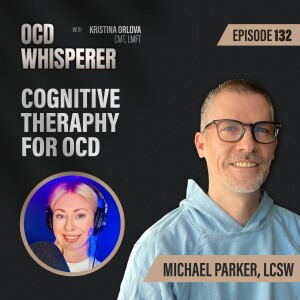
Tuesday Apr 01, 2025
132. Cognitive Therapy for OCD
Tuesday Apr 01, 2025
Tuesday Apr 01, 2025
In this riveting episode of the OCD Whisperer podcast, host Kristina Orlova sits down with Mike Parker, a licensed clinical social worker and the creator of the popular YouTube channel OCD Space.
Together, they embark on a deep dive into the world of OCD and the transformative power of Inference based cognitive-behavioral therapy (ICBT). But what happens when doubt becomes the driving force behind every thought? And how can someone trapped in the cycle of obsessional doubt ever learn to trust their own mind again?
Mike Parker pulls back the curtain on the insidious nature of "obsessional doubt," a phenomenon that leaves individuals questioning their every thought, memory, and perception. Why do those with OCD feel compelled to seek reassurance over and over, even when they know it offers only fleeting relief? And how does this relentless doubt keep them locked in a prison of their own mind?
As the conversation deepens, Kristina and Mike explore the critical differences between ICBT and exposure and response prevention (ERP). But here’s the burning question: Can understanding the origin of obsessive thoughts be the key to breaking free from their grip? Mike sheds light on how inferential confusion and obsessional doubt drive OCD.
This episode is a masterclass in navigating the labyrinth of OCD treatment. Will listeners walk away with a newfound understanding of how to confront their doubts? Or will the complexities of the human mind leave them questioning everything they thought they knew? Tune in to uncover the answers—and perhaps, a path to freedom.
In This Episode
[00:02] Introduction to the episode
[00:56] Understanding ICBT
[02:00] Obsessional doubt explained
[02:21] Differentiating ICBT from ERP
[03:36] The nature of obsessional doubt
[05:58] Reassurance-seeking behavior
[09:25] Understanding internal evidence
[11:27] The role of self-knowledge
[13:31] General facts vs. personal context
[14:49] Handling real mistakes
[16:40] Exploring early memories
[17:46] Understanding obsessional doubt
[19:22] Childhood influences on OCD
[20:28] Clarifying ICBT vs. psychodynamic therapy
[21:44] Focus of inference-based CBT
[22:41] Cognitive distortions in OCD
[25:34] Re-evaluating daily routines
[27:06] Timeframe for progress in treatment
[29:22] Complicating factors in OCD treatment
Notable Quotes
[00:02:42] "Obsessional doubt is a core process identified in OCD when you’re doing I-CBT. It’s a thought process where someone with OCD knows something but doesn’t trust themselves enough to stick with what they know, leading them to question, dismiss, and seek more information than they have." - Michael Parker
[00:18:26] "We can start to see how long the client has been telling themselves an obsessional story about themselves... It was all logged in there and then all put together, but if we go back, we can see this actually never meant you should be locked into never-ending doubt." - Michael Parker
[00:23:39]"I-CBT is primarily a cognitive therapy... The focus really is figuring out why you reject information, why you don't trust it... Let's figure out why you doubted." — Michael Parker
Our Guest
Mike Parker, LCSW, is a licensed clinical social worker and private practice therapist based in Pittsburgh, Pennsylvania. He specializes in treating obsessive-compulsive disorder (OCD) using cognitive-behavioral therapy (CBT) and inference-based cognitive therapy (I-CBT). As the host of the OCD Space YouTube channel, Mike is dedicated to educating individuals and mental health professionals on effective OCD treatment approaches. He is passionate about helping clients understand and overcome obsessional doubt while also training fellow therapists in evidence-based interventions. With a focus on empowering individuals to trust themselves and break free from the cycle of compulsions, Mike continues to be a leading voice in the OCD treatment community.
Resources & Links
Kristina Orlova, LMFT
Instagram YouTube OCD CBT Journal Tracker and Planner Website
Mike Parker
Website
LinkedIn
YouTube
Cognitive Therapy for OCD
Disclaimer
Please note, while our host is a licensed marriage and family therapist specializing in OCD and anxiety disorders in the state of California, this podcast is for educational purposes only and should not be considered a substitute for therapy.
Stay tuned for bi-weekly episodes filled with valuable insights and tips for managing OCD and anxiety. And remember, keep going in the meantime. See you in the next episode!
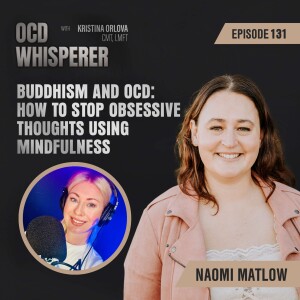
Tuesday Mar 18, 2025
131. Buddhism and OCD: How to Stop Obsessive Thoughts Using Mindfulness
Tuesday Mar 18, 2025
Tuesday Mar 18, 2025
Imagine struggling with intrusive thoughts that feel unbearable, unshakable, and all-consuming. You try to fight them, suppress them, or rationalize them away, only to find that they persist, growing stronger with every attempt to resist. But what if the key to managing OCD wasn’t in pushing these thoughts away, but rather in changing your relationship with them?
In this thought-provoking episode of The OCD Whisperer Podcast, host Kristina Orlova, LMFT, welcomes Naomi Matlow, a writer, educator, and OCD advocate, to explore how Buddhist psychology offers a fresh perspective on OCD management. Naomi, the author of A Thought is Just a Thought: A Buddhist Guide to OCD, shares how ancient Buddhist teachings on mindfulness, suffering, and attachment can help individuals with OCD develop a new understanding of intrusive thoughts.
Together, Kristina and Naomi dive deep into the nature of suffering, the role of acceptance, and practical techniques for navigating intrusive thoughts without letting them define you. This episode is a must-listen for anyone looking to integrate mindfulness-based approaches into their OCD recovery journey.
In This Episode
[00:00:00] Introduction to the episode [00:01:04] Naomi’s background and inspiration for writing her book [00:02:33] Understanding OCD through a Buddhist lens [00:04:03] How thoughts are like sensory perceptions [00:05:41] The Western tendency to over-identify with thoughts [00:07:12] The challenge of accepting intrusive thoughts [00:09:56] Clinging, aversion, and the roots of suffering in OCD [00:11:20] The Four Noble Truths and how they relate to OCD [00:13:20] The role of desire and resistance in maintaining suffering [00:16:29] Practical steps to cultivate acceptance and detachment [00:18:35] Shifting focus from thoughts to sensory experiences [00:20:45] Meditation techniques for intrusive thoughts [00:22:14] How to connect with Naomi [00:22:54] Closing remarks
Notable Quotes
[00:13:00] "An OCD thought is a thought you are not willing to have." – Naomi Matlow
[00:07:12] "We tend to put so much weight on the content of our thoughts, but thoughts are just another form of perception—like smelling something bad in the fridge. They don’t define who we are." – Naomi Matlow
[00:11:20] "Clinging to positive experiences or pushing away negative ones only deepens suffering. Acceptance isn’t about approval—it’s about allowing reality to be what it is." – Naomi Matlow
[00:25:00] "The body is always in the present moment, but the mind is often stuck in the past or worried about the future. That’s why grounding in the senses can be so powerful." – Naomi Matlow
Our Guest
Naomi Matlow is a writer, educator, and OCD advocate based in Southern California. In 2024, she published her creative thesis from Lesley University's Mindfulness Studies Master’s program, which evolved into A Thought is Just a Thought: A Buddhist Guide to OCD. Naomi’s work integrates Buddhist philosophy, mindfulness, and evidence-based OCD treatment approaches to help individuals develop a healthier relationship with their thoughts.
Resources & Links
Kristina Orlova, LMFT Instagram YouTube OCD CBT Journal Tracker and Planner Website
Naomi Matlow Instagram Website
Mentioned in This Episode: A Thought is Just a Thought: A Buddhist Guide to OCD by Naomi Matlow ICBT with Kristina Orlova and Christina Ennabe Sneaky Rituals with Jenna Overbaugh
Disclaimer
Please note while our host is a licensed marriage and family therapist specializing in OCD and anxiety disorders in the state of California, this podcast is for educational purposes only and should not be considered a substitute for therapy.
Stay tuned for biweekly episodes filled with valuable insights and tips for managing OCD and anxiety. And remember, keep going in the meantime. See you in the next episode!
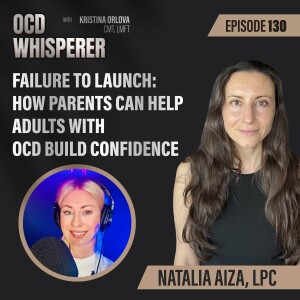
Tuesday Mar 04, 2025
130. Failure to Launch: How Parents Can Help Adults with OCD Build Confidence
Tuesday Mar 04, 2025
Tuesday Mar 04, 2025
Imagine this: A bright, capable adult, full of potential, yet paralyzed by the invisible grip of OCD. They live at home, rely on their parents for everything, and seem unable to take the first step toward independence. The parents, heartbroken and exhausted, wonder, “Where did we go wrong? How do we help without hurting?” It’s a delicate dance, a tightrope walk between support and enabling, between love and letting go.
In this compelling episode of The OCD Whisperer Podcast, host Kristina Orlova, LMFT, welcomes Natalia Aiza, LPC, co-founder of Kairos Wellness Collective, for an insightful discussion on the challenges of "failure to launch" among adults with OCD. Together, they explore the complexities of dependency, the role of parental accommodations, and actionable strategies to help individuals with OCD take meaningful steps toward autonomy. Natalia shares her expertise on fostering independence through gradual, supportive approaches while emphasizing the importance of real-world exposure, skill-building, and overcoming the mental barriers that OCD creates. This episode is a must-listen for parents, caregivers, and individuals navigating the journey toward self-reliance.
In This Episode
[00:00:02] Introduction to the episode
[00:01:04] Understanding "failure to launch"
[00:02:33] Dependency and OCD
[00:04:03] Parental guidance for adult children
[00:05:41] Research on dependency
[00:07:12] Creating independence plans
[00:08:53] Challenges of financial independence
[00:09:56] Motivation and comfort zones
[00:12:41] Gradual process of change
[00:13:20] Long-term parenting goals
[00:14:49] Overcoming anticipatory anxiety
[00:16:29] Learning new skills
[00:18:35] Real-world exposure through jobs
[00:19:27] Understanding OCD's impact on progress
[00:20:45] The importance of financial independence
[00:21:34] Rethinking personal rationalizations
[00:21:45] Taking action against OCD
[00:22:14] How to connect with Natalia
[00:22:54] Closing remarks
Notable Quotes
[00:03:23] "I have certainly encountered so many families over the years of just practicing and myself treating OCD patients, and a lot of times there is a lot of conversation from family and parents especially of like, what do I do? How do I help?" - Kristina Orlova
[00:11:20] "My job is to prepare my children for when I die. If I'm not preparing my children to live on and thrive when I am no longer here, then I am not fulfilling my purpose as a parent." - Natalia Aiza
[00:16:29] "Most of the time with OCD, we really have to feel worse before we feel better, and I just want to normalize that feeling of dislike for the process because it is a hard, formative challenge." - Natalia Aiza
[00:19:27] "OCD will try to interrupt and get in the way of any progress you are making, and the key is to respect the structure because the structure will immediately give you feedback, and it's feedback that hurts." - Natalia Aiza
[00:20:45] "Human beings are notorious for mental gymnastics. We can create so many rationalizations for why not to do something, so it's really important to pause and relook at your own thought process." - Kristina Orlova
[00:21:45] "OCD wants us in our heads, feeling like we can think our way out of it, but we can't. Only change and real-world experiences shake up your belief system." - Natalia Aiza
Our Guest
Natalia Aniela Aíza, LPC, is the founder and executive director of Kairos Wellness Collective, a leading OCD clinic based in Boulder, Colorado. A Harvard graduate and daughter of a political refugee, Natalia brings a unique perspective to mental health care, shaped by her multicultural background and fluency in multiple languages. With a career dedicated to serving diverse communities—including Latinx populations and medically complex children—Natalia is a passionate advocate for social justice and expanding access to effective OCD treatment. Under her leadership, Kairos Wellness Collective has helped over 2,000 clients across four locations. Natalia is also a writer, speaker, and advocate committed to improving mental health care and practitioner competency.
Resources & Links
Kristina Orlova, LMFT
https://www.instagram.com/ocdwhisperer/
https://www.youtube.com/c/OCDWhispererChannel
https://www.korresults.com/
https://a.co/d/fMT6vte
Natalia Aiza
https://www.kairoswellnesscollective.com/natalia-aiza
https://www.linkedin.com/in/natalia-a%C3%ADza-0a1615174
https://www.instagram.com/letstalk.ocd/
Mentioned
Sneaky Rituals with Jenna Overbaugh
ICBT with Kristina Orlova and Christina Ennabe
OCD CBT Journal Tracker and Planner
Disclaimer
Please note while our host is a licensed marriage and family therapist specializing in OCD and anxiety disorders in the state of California, this podcast is for educational purposes only and should not be considered a substitute for therapy.
Stay tuned for biweekly episodes filled with valuable insights and tips for managing OCD and anxiety. And remember, keep going in the meantime. See you in the next episode!









